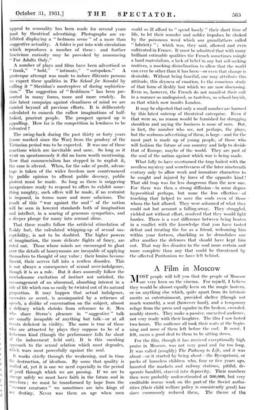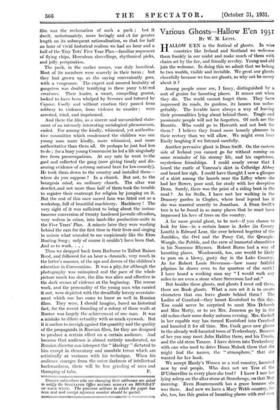A Film in Moscow
MOST people will tell you that the people of Moscow are very keen on the cinema. For myself, I believe they. would be almost equally keen on the magic lantern, or on anything else which, quite apart from its intrinsic merits as entertainment, provided shelter (though not much warmth), a seat (however hard), and a temporary refuge from the press and squalor in the broken, crowded, muddy streets. They make a passive, unexcited audience, not very ready with their laughter. The film I saw lasted two hours. The audience all took their scats at the begin- ning and none of them left before the end. It must, I felt, mean a good deal to them to be sitting down.
For the film, though it has received exceptionally high praise in Moscow, was not very good and far too long. It was called (roughly) The Pathway to Lift, and it was about—or it started by being about —the Byezpriorni, or packs of homeless children who, four or five years ago, haunted the markets and railway stations, pitiful, de- sperate banditti, starved into depravity. Their numbers then were probably underestimated at 300,000, but yeti, creditable rescue work on the part of the Soviet autho- rities (their child welfare policy is consistently good) has since enormously reduced them. The theme of the film was the reclamation of such a pack ; but it dwelt, unfortunately, more lovingly and at far greater length on its subsequent rationalization, so that for half an hour of vivid historical realism we had an hour and a half of the Tiny Tots' Five Year Plan—familiar sequences of flying chips, Herculean shovellings, rhythmical picks, and jolly perspiration.
The pack, in the earlier scenes, was duly horrifical. Most of its members were scarcely in their teens ; but they had grown up, as the saying conveniently goes, with a vengeance. The expert and assured brutality of gangsters was doubly terrifying in these puny tattered creatures. Their leader, a swart, compelling gnome, looked to have been whelped by Sycorax and tutored by Capone. Coolly and without emotion they passed from robbery to violence, from violence to murder : were arrested, tried, and imprisoned.
And there the film, as a sincere and unvarnished state- ment of an intensely interesting sociological phenomenon, ended. For among the kindly, whimsical, yet authorita- tive committee which condemned the children was one young man more kindly, more whimsical, and more authoritative than them all. Or perhaps he just had less to do ; for a busy young Communist he led a life singularly free from preoccupations. At any rate he went to the gaol and collected the gang (now giving timely and dis- arming evidence of a strong natural bent for low comedy). He took them down to the country and installed them— where do you suppose ? In a church. But not, to the bourgeois mind, an ordinary church. The altar was derelict, and not more than half of them took the trouble to register their contempt for religion by jumping on it. But the rest of this once sacred fane was fitted out as a workshop, full of beautiful machinery. Machinery ! The very sight of it was sufficient to bring about the instan- taneous conversion of twenty hardened juvenile offenders, very wolves in crime, into lamb-like production-units in the Five Years' Plan. A minute later they were washing behind the ears for the first time in their lives and singing in unison what sounded to me suspiciously like the Eton Boating Song ; only of course it couldn't have been that. And so to work. . . .
Thus we dropped back from Barbusse to Talbot Baines Reed, and followed for an hour a chronicle, very much in the latter's manner, of the ups and downs of the children's education in Communism. It was a pity, for although the photography was uninspired and the pace of the whole picture much too slow, the film was alive and effective in the dark scenes of violence at the beginning. The rescue work, and the personality of the young man who carried it out, were depicted with the dreadfully breezy overstate- ment which one has come to know so well in Russian films. They were, I should imagine, based on historical fact, for the recent founding of a colony of these waifs at Rostov was largely the achievement of one man. It was a mistake to dilute actuality with so much eyewash. But it is useless to inveigh against the quantity and the quality of the propaganda in Russian films, for they are designed to produce a certain effect on a certain audience. And because that audience is almost entirely uneducated, no Russian director can interpret the " ideology " dictated to him except in elementary and unsubtle terms which are artistically at variance with his technique. When his audience emerges from the outer darkness of intellectual backwardness, there will be less grinding of axes and







































 Previous page
Previous page